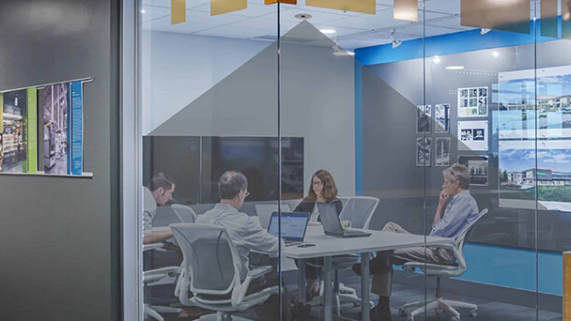The following article was written by Tom Demeropolis of the Cincinnati Business Courier and can be found online here. Please support BizJournals with a subscription or by following them on social media.
A fast-growing Cincinnati technology firm specializing in measuring and analyzing workspace use is looking to help companies bring their employees back to the office safely during the Covid-19 pandemic.
Downtown-based AVUITY has added a suite of health and safety offerings designed to help reduce the risks of coronavirus transmission among workers. These extensions of the company’s space use software and occupancy sensor platform and specifically designed to inform and guide evolving return-to-work strategies.
Brad Johnson, CEO of AVUITY, said when Covid-19 hit, he had a lot of conversations with clients about how to safely bring people back to the office. Prior to the pandemic, AVUITY’s products helped office users figure out how much of their space was being used and how often. This led to a better understanding of their space needs and helped improve the employee experience.
Now, the pandemic has increased office users’ needs to understand their space better, he said.
“This has created an environment where we’re not all back to the office, people are coming and going, some are working from home, and we need to understand our space better,” Johnson told me. “As people come back into the office, they need to manage space differently.”
AVUITY’s flagship products are VuAI, VuSensor and VuBook, which work together to collect data and analyze trends in workspace use. The new features include:
- Real-time notifications if spaces are either too highly populated or areas reach a threshold density based on maximum capacity
- Automatic booking of nearby workstations to limit the number of workers in immediate proximity to one another in high use zones
- Notifications when workstations, meeting rooms, cafés or bathrooms have reached a threshold of visitors and require their next cleaning
- Ability to adjust protocols for space usage as health concerns change over time.
“We’re showing users the last time a space was used (and) if it’s been cleaned since the last time someone used it,” Johnson said.
Jarrod Easterwood, director of marketing and partner relations for AVUITY, said a key piece of the products is the ability to adjust. Working in the office could be very different in the fall compared to the winter or spring.
“We can adjust and move as more people get back in the office,” Easterwood said.
AVUITY also invested in a new user interface, making it easier to find and select workspaces.
Johnson said AVUITY’s customers across the globe have reacted to the pandemic differently. In France, AVUITY is installing its product for a client that is seeking to monitor occupancy on a floor by floor basis, as well as monitoring meeting room spaces. In the Middle East, a customer has taken a “gamification” approach, where employees get points they use to book space and once they are out they can’t book those spaces any more.
In the U.S., companies that had been doing desktop booking pre-Covid-19 had moved away from that process because it was frustrating for employees to remember to pick a workstation. Now, those employers have shifted back so they can control where employees sit to make sure they are spaced properly.
“Everyone thinks about it a little differently, they have different ideas about what makes work best for them,” Johnson said.
While AVUITY’s core customer has been corporate users — about 90% of its clients up until earlier this year — the company is seeing more interest from other sectors with Covid-19. Colleges and universities are looking into its products to determine study room usage and AVUITY has had interest from retailers are well.
One of AVUITY’s clients, a beverage manufacturer, is using its system for booking work stations to ensure proper distancing. Another client, Blue Cross and Blue Shield of North Carolina, is using AVUITY for its space use and booking technology.
Over the next six to 12 months, Johnson is expecting Covid-19 will help increase the company’s already impressive growth. AVUITY was seeing year-over-year growth of about 50% to 70%. Johnson expects that growth to be 100% the next couple of years.
AVUITY was launched in 2012 in partnership with BHDP Architecture. The company has been independent of the downtown-based architecture firm since 2015 and has grown to 20 employees.


